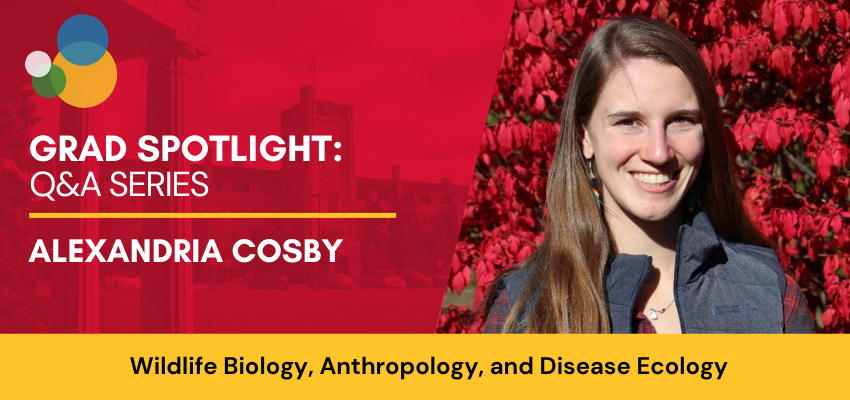Alexandria Cosby Spotlight: A Passion for Wildlife Biology and Disease Ecology

What is your program and area of research?
I completed my Master’s in Public Issues Anthropology with a specialization in One Health in the spring of 2023. During this time, I researched the disease implications of humans and lemurs sharing an environment. For my research, I was incredibly fortunate to have travelled to Madagascar for three months to collect data in a remote area. My days mostly consisted of following groups of lemurs through incredible forests, monitoring their behaviour, and collecting fecal samples to see if those closer to the community exhibited different behaviours or higher levels of parasites.
What do you wish your colleagues, friends, or family knew about your work?
Although completing an ecology project within an anthropology department may seem unusual, the social implications of my research made an interdisciplinary approach the most sensible choice. Madagascar faces unique challenges due to the joint humanitarian and biodiversity crises. From an outsider’s perspective, it can be easy to assign blame and make judgments, but living there reveals how external circumstances and the dire nature of many day-to-day situations are largely to blame. If I had conducted this research in a strictly scientific department, the cultural context of the biodiversity crisis and my research might have been overlooked. The narrative of my results could have placed blame on local communities, perpetuating the notion that those in the global South are the world’s scapegoats. However, by using a One Health approach and utilizing the skills I developed in the anthropology program, I was able to present my findings while ensuring the nuances of this interconnected issue were not understated.
How would you explain your discipline and/or research to someone who wasn't in your program?
My discipline intersects with several related fields, and I am training to become an interdisciplinary researcher—someone who can navigate between stakeholders while recognizing their own limitations. Stepping outside my comfort zone and taking on a Master’s of Arts has forced me to look at other perspectives and have patience for complex issues. Everyone has different positionalities, objectives, and biases, and being an interdisciplinary researcher involves understanding these differences while striving towards common goals that result in the most favourable outcome for everyone.
Have you learned or discovered anything that has surprised you since beginning your studies at Guelph? If so, what?
Although the university is somewhat siloed by departments, I’ve admired how much collaborative research happens throughout the institution. It is not uncommon to see professors publishing with others outside their department, gaining new perspectives, and stretching the reach of their findings. As an early career researcher, sometimes it seems like publishing is a cutthroat sport. However, as I’ve spoken to more people and attended departmental seminars, I’ve noticed a lot more collaboration and kindness than I anticipated, which has been reassuring as I enter a new stage in my academic career.
What is your proudest accomplishment?
While I am proud of my mainstream academic accomplishments, I am most proud of maintaining a work-life balance. Before going to grad school, I heard horror stories about the sacrifices that needed to be made to succeed in academia, such as losing touch with friends and family. I have been proud of myself for maintaining a life outside of my education by making time for friends and hobbies that bring me joy. We often get caught up in big milestones and goals, but reflecting on my grad school experiences, I am proud of how I’ve managed to prioritize my personal growth alongside my academic accomplishments.
What drives you?
I have always been a goal-oriented person but one of my strengths is being able to see the bigger picture and break down the different paths that will get me to where I want to be. After high school, I took a gap year to travel and work in wildlife conservation and rehabilitation. I fell in love with the work and the sense of purpose it gave me, and I knew I wanted to find a career that would give me that same feeling every day. Although I don’t know what the next chapter of my life will hold, I know I want to feel as fulfilled in my career as I do in my personal life, both of which I’m sure will be filled with exploring the natural world.
Is there a fun or interesting fact about yourself that you’d like to share?
When I was looking into post-secondary options, the University of Guelph was the first place I toured. I fell in love with the campus right away and barely looked at any other schools. Guelph was the only place I applied to, knowing it was where I belonged. I completed my Bachelor’s in Wildlife Biology in 2021, then moved on to complete a Master’s in Public Issues Anthropology with a specialization in One Health in 2023. Now, I am back in Integrative Biology pursuing a PhD. Guelph is now my home, and I feel incredibly privileged to continue my education here.